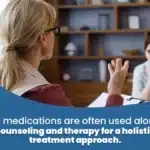If you’ve ever found yourself searching on the internet about whether it’s safe to combine alcohol with Zoloft, you know it can be challenging to find the information you’re seeking.
But, knowing the risks of drinking while taking a prescription medication is critical to being responsible and staying safe. There are potential side effects of mixing alcohol with a prescription because both alcohol and medications for mental health conditions affect the brain.
Here’s what you need to know about the medication known as Zoloft and what happens when you mix alcohol and Zoloft.
What Is Zoloft?
Zoloft (sertraline) is a prescription medication that is used to help with symptoms of depression, which occur in major depressive disorder. It is also used by medical professionals to help treat obsessive-compulsive disorder (OCD), panic disorder, post-traumatic stress disorder, premenstrual dysphoric disorder, and social anxiety disorder, according to the US National Library of Medicine.
How Does Zoloft Work?
Zoloft is in the selective serotonin reuptake inhibitor (SSRI) class of medications, similar to other medications that you may be familiar with like Prozac (fluoxetine) and Celexa (citalopram).
As an SSRI, Zoloft takes its effect by manipulating the amount of the neurotransmitter serotonin that is available within the nervous system. Serotonin has a wide range of effects throughout the body, but altering levels of serotonin in the brain can influence many processes related to behavior—such as mood, perception, memory, stress responses, and addiction.
Like many other SSRI medications, Zoloft carries a serious black-box warning that taking it can increase suicidal thoughts and behavior, especially in young patients. For this reason, although Zoloft treats depression, medical professionals are very careful about prescribing it—particularly when it comes to combining it with other medications or substances.
Is It Okay to Drink Alcohol While Taking Zoloft?
Put simply, medical professionals advise that you avoid drinking alcohol when you are taking Zoloft as an antidepressant medication. Alcohol and Zoloft both target neurotransmitters in the brain, so mixing them can amplify the effects of one or the other.
Medical professionals note that combining alcohol and Zoloft can increase your risk of psychomotor impairment, which means that you are more likely to suffer from communication problems between your brain and muscles. This can lead to problems walking, talking, and moving in the world, which can put you in danger’s way.
The US Food and Drug Administration (FDA) also notes that because Zoloft, itself, can cause side effects such as sleepiness, impaired decision-making, decreased reaction time, and blood pressure changes, It should not be combined with alcohol, which can also cause or amplify these side effects of Zoloft.
If you have been prescribed Zoloft but feel you may not be able to avoid drinking alcohol, you must talk to your medical professional about a potential therapy modification. It is also a good idea to bring up your concerns about your relationship with alcohol since alcohol use contributes to depression.
Taking Medications for Treatment of Alcohol Abuse While Taking Zoloft
If you have a history of alcohol abuse and you are currently in recovery, it is also important to be informed about the risk of taking Zoloft. The FDA notes that Zoloft contains a small amount of alcohol as an ingredient in its oral solution form.
This means that taking an anti-alcohol medication, such as disulfiram (Antabuse), with Zoloft can make you experience a disulfiram-alcohol reaction. Disulfiram is intentionally designed to make you sick when you drink alcohol, which is why it is a powerful deterrent from drinking.
You may be unaware that you are drinking alcohol when you take Zoloft in its oral form and so may become unintentionally ill; symptoms include skin flushing, nausea, vomiting, headache, sweating, palpitations, and weakness.
Curbing Alcohol Use While Taking Zoloft
Once you’ve learned about the side effects of mixing Zoloft and alcohol, you know that the safest course is to just avoid all alcohol in the first place. However, even if you know intellectually that combining Zoloft with alcohol is not the best plan of action, you may feel like it is difficult to stop drinking.
If you find yourself struggling with your alcohol use—being unable to stop drinking even when you know you should or want to—addressing your concerns can be frightening. However, a structured treatment program can help connect you with the resources you need so that you can take back full control of your life and your health.
Addressing Mental Health Conditions and Alcohol Abuse Together
If you are concerned that you may have an alcohol addiction on top of a preexisting mental health condition, you’re not alone. According to the Substance Abuse and Mental Health Services Administration, more than 9 million adults in the US are experiencing a substance abuse disorder along with a mental health condition, such as anxiety, depression, bipolar disorder, post-traumatic stress disorder, or schizophrenia.
Often, a substance use disorder develops as a result of a mental health condition as people seek to self-medicate. However, because substance use disorders can damage the brain, they can also independently make people more vulnerable to developing a mental health condition even when one didn’t exist previously.
When a person has two or more substance abuse or mental health conditions, they are referred to as co-occurring conditions. When seeking treatment for a substance use disorder, it’s important to address all co-occurring conditions as well because focusing on just one and dismissing the others can make it hard to successfully achieve a full recovery.
Finding Help With Substance Abuse Disorders and Mental Health Conditions
If you live in South Florida and you’re facing a combination of an alcohol abuse disorder and a mental health condition, Haven Detox is here to help.
We understand that it’s counterproductive to treat just one aspect of addiction without addressing the other aspects that may be feeding into it, such as depression and anxiety. At our premier treatment facility, we use evidence-based treatment programs to help our patients address substance use disorders and mental health conditions directly so that they can begin or continue their recovery journey. Contact us today at (561) 328-8627 for further information about your treatment options.






